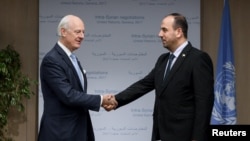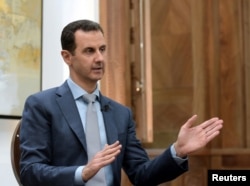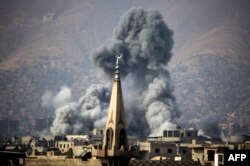U.N. envoy for Syria Staffan de Mistura said despite some concerns about recent violence, he believes "a moment of truth has arrived" as he prepared to launch a new round of peace talks aimed at ending nearly seven years of fighting.
The U.N.-led talks in Geneva are due to begin Tuesday, the eighth round since 2012. Many of the prior attempts quickly fell apart amid major disagreements between the Syrian government and rebel delegations, including about whether President Bashar al-Assad should remain in office.
The two sides appear to be in the same position after opposition delegation chief Nasr Hariri told reporters Monday their goal is for Assad to not be in power when a political transition begins.
U.N. spokeswoman Alessandra Vellucci said Tuesday the Syrian government delegation had not yet arrived in Geneva, but was planning to travel there on Wednesday. Syria's state news agency SANA reported Tuesday the delegation's delayed departure was due to the opposition's demand that al-Assad step down.
De Mistura planned to go ahead Tuesday with meetings with opposition figures. Prior rounds of peace talks have proceeded under similar circumstances with one party arriving a day or two late.
After meeting the opposition delegation Tuesday, de Mistura said the two sides would have the opportunity to negotiate directly for the first time.
"We are going to offer it. We will see if this takes place. But we will be offering that," he said.
De Mistura said he believes it is possible for the two sides to narrow their differences as they negotiate under a framework approved by the U.N. Security Council that calls for a new constitution and elections. But he reiterated his mediation team will not accept either side entering the talks with preconditions.
"This crisis, one of the worst in the history of the United Nations, now has the potential to move towards a genuine political process," the envoy said. "We see the emergence of international consensus, and we must begin to stitch the process into concrete results, enabling Syrians to determine their own future freely."
University of New South Wales senior lecturer Anthony Billingsley says with the gains the Syrian military has made with the backing of Russia and Iran, rebel hopes of toppling Assad are not realistic at this point.
"Everybody apart from some of the opposition groups, and perhaps the U.S., has accepted that Assad need not necessarily go. So there’s a fundamental problem there if the Geneva talks are going to make any progress," Billingsley told VOA.
The Syrian government, meanwhile, agreed Tuesday to a ceasefire in rebel-held rebel-controlled Eastern Ghouta, according to de Mistura.
"Russia has proposed and the government has accepted a cease-fire in Eastern Ghouta," de Mistura told reporters.
Eastern Ghouta, located east of Damascus, is among the last remaining opposition strongholds in Syria and one of four "de-escalation zones" that were established to reduce violence.
The fighting in Syria began in 2011 with peaceful protests against Assad and a government crackdown, eventually leading to a multi-party conflict that has left more than 400,000 people dead and 13 million in need of humanitarian aid.
Victor Beattie in Washington D.C contributed to this report..







